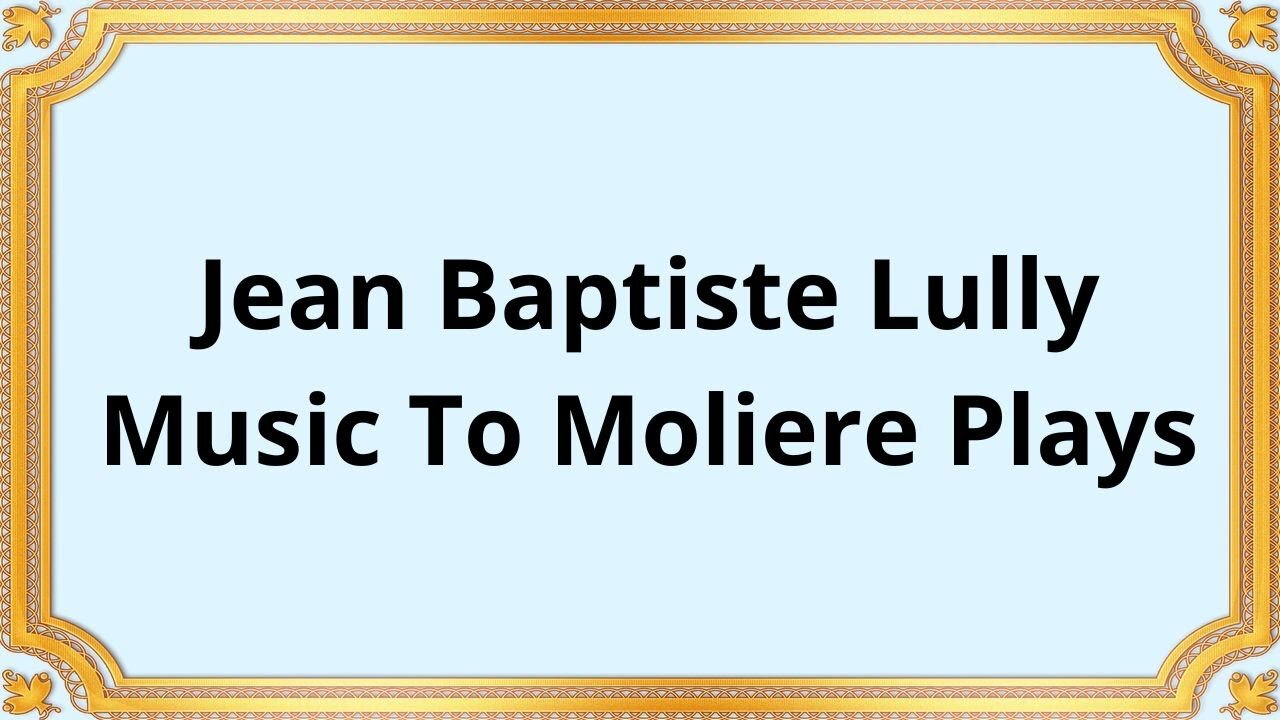Premium Only Content

Jean Baptiste Lully Music To Moliere Plays
#JeanBaptisteLully #MusicToMolierePlays #ClassicalMusic #FrenchComposer #BaroqueEra #TheaterMusic #Ballet #FrenchBaroque #Collaboration #DramaticMusic
Françoise PETIT, harpsichord
Choir of the Musical Youth of France
Paris Concert Chamber Orchestra
Director: Louis MARTINI
Jean Baptiste Lully, a prominent French composer of the Baroque era, made significant contributions to the world of classical music. His collaboration with the renowned playwright Jean-Baptiste Molière resulted in the creation of captivating music for Molière's theatrical works.
During the 17th century, Jean Baptiste Lully and Jean-Baptiste Molière formed a remarkable partnership in the French court. Lully, serving as the court composer, composed music that perfectly complemented Molière's theatrical works. This collaboration was instrumental in revolutionizing French theater, as their combined efforts elevated the art of dramatic performance to new heights.
Lully's music for Molière plays embodies the essence of French Baroque theater music. It seamlessly integrates with the dramatic narrative, enhancing the emotions, and highlighting the comedic and tragic aspects of the plays. Lully's compositions for Molière's works often included vibrant overtures, lively dance movements, and expressive vocal pieces.
One of the notable features of Lully's music was his skillful use of dance forms, such as the minuet or the gavotte, which added a sense of elegance and grandeur to the theatrical productions. The combination of melodic lines, rich harmonies, and rhythmic patterns created a sonic tapestry that enhanced the overall theatrical experience.
Lully's music to Molière plays holds immense significance in the realm of French Baroque theater. The collaboration between Lully and Molière revolutionized the way music was integrated into theatrical performances. By composing music that aligned perfectly with the dramatic moments onstage, Lully enhanced the emotional impact of the plays and created a sense of unity between the spoken word and the musical accompaniment.
This collaboration also played a crucial role in elevating the status of theater music in French society. Lully's compositions for Molière's plays showcased the potential of music to enhance storytelling, leading to a greater appreciation for the art form and inspiring future generations of composers to explore the relationship between music and theater.
Conclusion:
Jean Baptiste Lully's music for Molière plays stands as a testament to the power of collaboration and the transformative nature of music in the realm of theater. Through their partnership, Lully and Molière created a harmonious fusion of music and drama, setting the stage for the development of French Baroque theater. Lully's compositions enhanced the emotional impact of Molière's plays, captivating audiences and revolutionizing the way music was integrated into theatrical productions. As we reflect on Lully's music for Molière plays, we gain a deeper appreciation for the enduring legacy of this collaboration and its profound impact on the world of classical music and theater.
You have the opportunity to support the channel:
https://destream.net/live/RadSiarAl/donate
https://www.buymeacoffee.com/6355radsiaral
-
 34:26
34:26
Classical music_Music Inspiration
3 months agoAram Khachaturian Concerto for Violin and Orchestra
1392 -
 LIVE
LIVE
Welcome to the Rebellion Podcast
15 hours agoMedia Lying about Pete Hegseth? - WTTR Podcast Live 4/22
5,349 watching -
 1:20:09
1:20:09
Game On!
16 hours ago $0.66 earnedNico Harrison didn't know Luka was IMPORTANT to Maverick FANS!
20.9K -
 14:23
14:23
World2Briggs
16 hours ago $3.74 earnedTop 10 Places Where Welfare Checks Are the Local Economy
51.9K17 -
 13:50
13:50
Clownfish TV
18 hours agoRey Movie BUMPED for Ryan Gosling's Star Wars Movie?!
31.9K11 -
 1:01:42
1:01:42
Kyle Fortch
12 hours ago $2.00 earned'Radio' Rodney Smith: Hosting Red Carpets, Favourite Artist Interviews, & MORE | THE ONE SHEET S1E13
22.5K2 -
 1:13:08
1:13:08
MTNTOUGH Fitness Lab
22 hours agoJim Burgen: The Hard Truth About Leading Men | MTNPOD#113
33.8K4 -
 37:59
37:59
BibleUnbound
19 hours agoThe Complete Story of John: The Apostle | How to Love Like Christ
20.3K8 -
 56:22
56:22
Vedic compatability astrology
15 hours ago"From Death to Divine: My Awakening, Healing & Soul Path Revealed"
26.2K2 -
 8:54
8:54
VSOGunChannel
14 hours ago $3.24 earnedBREAKING: Anti Gun Activist Megan Bennett Removed from ATF
57K18